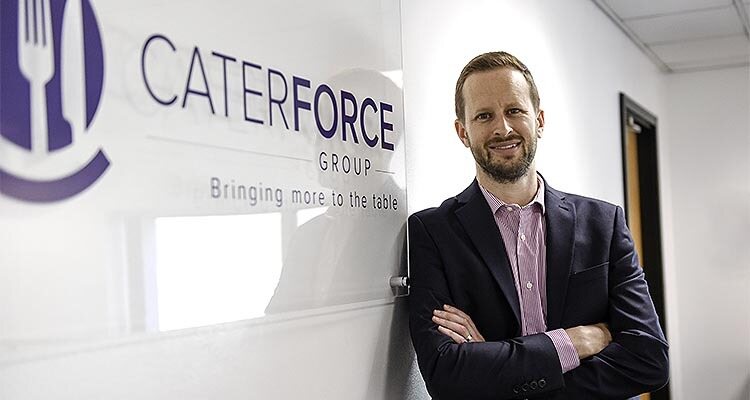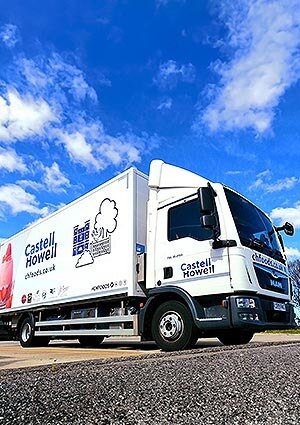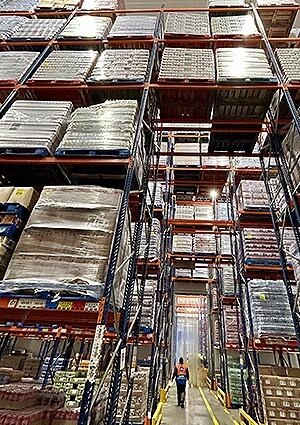
Why collaboration and communication are key for the buying and marketing consortium, Caterforce
Caterforce is one of the UK’s largest buying and marketing consortiums that has undergone significant transformation to reach its current stronghold in the market. Originally founded as The Independent Frozen Foods Wholesalers Consortium in 1991, the business now comprises nine wholesalers, or ‘members’, to which Caterforce provides industry-leading marketing solutions using its decades of experience and expertise.
Gary Mullineux, Managing Director of Caterforce, joins us to discuss the company’s evolution and the benefits it brings to both wholesalers and suppliers. “When wholesalers become a member, they get equal shares within the business, meaning we are ultimately owned by our wholesalers,” he begins. “We’ve come a long way from a combined turnover of around £85 million to now be approaching £800 million, with all our profits going back to the wholesalers. We’re also a member of European Catering Distributors (ECD), which comprises 15 businesses across 17 European countries.
“With an in-house marketing team, we offer our members a fully integrated marketing solution that covers digital and print marketing. We even have an in-house photography studio to shoot product images. It’s all about making the product look right, with an accurate description and correct allergen information, which then feeds into the members’ ecommerce systems.
“We optimize all products that come through our system, whether from central suppliers or our own brand items,” he continues. “We also have a sales platform that allows suppliers to access real-time data to see what’s happening with the products. They can filter the selection to see how products are performing within the relevant category, for example by weekly sales, wholesalers, or by customer type.
One-stop solution
“We also run events where we get all of our wholesalers under one roof and allow suppliers to pitch products and present new ideas, as well as biannual conferences where we discuss the strategic position of each of the wholesalers.”
Gary proposes: “The two biggest benefits of being part of Caterforce are economies of scale to secure better commercials to help our wholesalers compete with national distributors in the marketplace, as well as the benefit to their businesses of sharing best practice. Our members see each other as colleagues, rather than competitors, so they collaborate to solve problems and share market insights to help one another.”
Turning to facilities, he adds: “We’ve got 32 depots across the UK with over 60,000 pallet spaces, and 690 vehicles that make around 37,500 deliveries every week to our base of around 35,000 customers. Our members continually invest in infrastructure, so there are always warehouse extensions underway, but current investments are focused on software.
Robust relationships
Like many businesses, Caterforce has faced the challenges of supply chain and inventory over the last few years, with several geopolitical issues shaping the stability of supply chains across the globe. “It’s been difficult to stay ahead of market trends and try to predict supply and demand in the rapidly changing market that has become synonymous with post-pandemic consumers,” Gary explains.
“We work with several data providers to better understand what’s happening within the market, with the aim of staying ahead of consumer trends. We have over 9000 products within our portfolio, offering a one-stop solution for our customers’ varying demands and preferences, from gluten-free or high-protein products to vegan alternatives.
 “We pride ourselves on delivering a high service level to our members who are regional family businesses. We also work closely with suppliers, for instance, to ensure we communicate any issues effectively and accurately track the progress of deliveries and contracted volumes.”
“We pride ourselves on delivering a high service level to our members who are regional family businesses. We also work closely with suppliers, for instance, to ensure we communicate any issues effectively and accurately track the progress of deliveries and contracted volumes.”
Sustainability champions
Conversation inevitably turns to the topic on everyone’s mind – sustainability. “Our own-label range provides us with a great opportunity to make an impact in the area of sustainability,” Gary says. “This year we’ve removed 13 tonnes of salt and 19 tonnes of sugar from our products, for instance, to promote healthier living, to meet new government legislation and we’ve also adopted unbleached cardboard for 92 percent of our packaging.
“Whilst we’ve come a long way on our sustainability journey, there is still so much more to do. Our wholesalers are also investing in sustainability to reduce their emissions. We have some great wholesalers within the group that are leading by example, two of which are Hunt’s Food Group and Castell Howell Foods.
“Both members are our sustainability champions. Castell Howell is investing heavily in several methods and technologies to reduce emissions. Hunt’s Food Group, a BCorp organization, managed to reduce vehicle emissions by 76 percent last year by adopting biofuels. Both are great examples of how our members have embraced sustainability and made considered investments to reduce emissions.”
With a focus on continuous improvement, whether in terms of sustainability, product ranges, or customer service, Caterforce is well positioned to continue its journey of success. “Through constant collaboration, we’re becoming stronger and stronger,” Gary concludes.